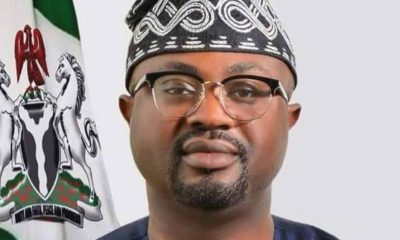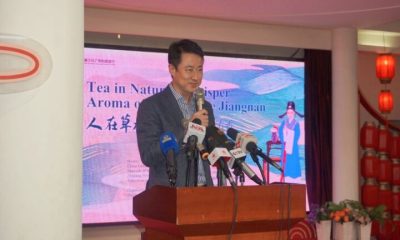Science & Tech
NCC: How Telecoms Investment in Nigeria has Grown

The Nigerian Communications Commission (NCC) on Wednesday announced that foreign direct investment (FDI) and local investment in the nation’s telecommunications sector reached 75.6 billion dollars as of 2021.
The Executive Vice Chairman of NCC, Prof. Umar Danbatta, made the announcement officially during an interactive session with stakeholders in the communications media ecosystem in Lagos.
He said this was one of the landmark developments that had shaped the trajectory of growth in the telecoms sector since he became the chief telecom regulator in August 2015.
According to Danbatta, in 2018, investment profile in the sector stood at 68 billion dollars, increased to 70.
5 billion dollars in 2019, and 72 billion dollars in 2020.Danbatta said that, at the end of 2021, the figure rose to 75.6 billion dollars, noting that the latest figure was the current official investment profile computed in the industry, up from the initial 70 billion dollars investment in the last few years.
“Investment in the telecommunications sector in Nigeria is computed from two sources: the Central Bank of Nigeria (CBN), and the financial data obtained from service providers by the Commission.
“While the CBN collects and calculates an element of the telecoms sector to include FDI, portfolio and others, the Commission collects investment figures from telecom licensees described as domestic investment arising from capital expenditure (CAPEX), which form part of the total investment in the industry,” he said.
The NCC boss noted that through effective regulatory environment put in place by the Commission, the telecom sector had recorded tremendous growth from an initial investment profile of 500 million dollars as at 2001, when the sector was fully liberalised.
Similarly, Danbatta said the telecom sector had continued to be a major contributor to Nigeria’s economy through an impressive sectoral contribution to the nation’s Gross Domestic Product (GDP) quarterly.
He noted that this was up from about 8.5 per cent in third quarter of 2015, contributing N10.126 trillion to the nation’s GDP in 2022 alone.
Citing data from the National Bureau of Statistics (NBS), Danbatta said the telecoms sector contributed N10.126 trillion as an aggregate quarterly contribution to GDP in 2022.
“In the first quarter, the sector contributed 12.94 per cent equivalent to N2.246 trillion while the second quarter witnessed an all-time high GDP contribution by the telecom sector to the nation’s economy, standing at 15 per cent and valued at N2.593 trillion.
“The sector’s contribution to GDP in the third quarter was 12.85 per cent and in the fourth quarter, it grew to 13.55 per cent, which are valued at N2.436 trillion and N2.851 trillion respectively.
“The growth trajectory continued this year as telecoms and Information services sector in Nigeria delivered a handsome N2. 508 trillion in terms of financial value contribution to the nation’s GDP, representing 14.13 per cent in the first quarter of 2023, ”he said.
Danbatta added that telecoms contribution to national GDP had grown significantly since his assumption of office as the executive vice chairman of NCC in August, 2015, according to available data from NBS.
He said that from 8.50 per cent in 2015, it grew to 9.13 per cent in 2016 and to 8.66 per cent in 2017, adding that in the last quarter of 2018, telecoms contributed 9.85 per cent to national GDP while it added 10.60 per cent in the fourth quarter of 2019.
“Also in the second quarter of 2010, it added 14.30 per cent to GDP; 14.42 per cent in the second quarter of 2021. The highest quarterly contribution to GDP by the sector to the economy was 15 per cent in the second quarter of 2022.
“The sector has become a major enabler of economic development in Nigeria, as it continues to positively impact all the facets of the Nigerian economy.
“As the regulatory authority for the telecom sector in Nigeria, we are happy that the sector has recorded phenomenal growth statistics in the past two decades of the liberalization of the telecoms sector, “he said.
He said the commission would continue to push upward to greater heights by encouraging expansion of frontiers to put Nigeria’s imprint on the global map of digital economy.
According to Danbatta, broadband subscriptions on Third Generation (3G) and Fourth Generation (4G) networks increased to 92.2 million, representing a 48.28 per cent broadband penetration in the country.
He also noted that following the issuance of 3.5GHz spectrum licenses for the deployment of Fifth Generation (5G) networks in Nigeria, 5G subscriptions had grown to over 60,000 in many cities of the federation.(NAN)
NEWS
JAMB Needs Rigorous System Test, Technical Glitch Maybe More Extensive – Experts

Information Technology experts have attributed the recent technical glitch experienced during the Joint Admissions and Matriculation Board (JAMB) examination to inadequate testing of the system.
The experts spoke during a television broadcast on Thursday night.
The experts said that the system should have been subjected to rigorous testing, which included regression testing, to ensure it could handle the high volume of users.
The body which runs Nigeria’s university entrance exams had admitted to a “technical glitch” which compromised some results of this year’s tests, after nearly 80% of the students got low grades.
The low pass rate had sparked widespread outrage, with students complaining about not being able to log in to the computers, questions not showing up and power cuts making it impossible to take the examinations.
The President, Mr Bimbo Abioye, Institute of Software Practitioners of Nigeria (ISPON), said that system glitches could happen, irrespective of country.
Abioye noted that globally, big names like Microsoft, Meta among others have had their share of system glitches, as recent as 2024 and 2025.
He said that everyone was seeking perfection but anything technical could malfunction and one should not be too confident.
According to him, a whole lot can be done to minimise such possibilities and reduce the chances of error to near zero.
“Especially, when you are dealing with systems that the whole nation is relying on.
“The process has got to be very rigorous, the testing processes and the various validations before the system is rolled out.
“It is because system glitches can have significant impact just like we are seeing now,” Abioye said
The Vice-Chairman, Computer Professionals Registration Council of Nigeria, Dr Eyo Essien, said that system failure was likely due to the inability of the software to handle the surge of users.
Essien said that the software was not subjected to proper testing to see if it could work with a high volume of users.
“A system that is not tested for three million or five million concurrent users will fail if suddenly there is a surge of users.
“The solution was not properly tested, especially for regression testing, which is designed to see if the system can function correctly under high load,” he said.
He, however, encouraged proper engagement of professionals such members of the Computer Professionals Registration Council of Nigeria.
The experts also called for a comprehensive evaluation of the system to determine the extent of the problem and to prevent future occurrences.
JAMB had attributed the technical glitch to a network issue, but the experts believe that the problem may be more extensive than initially thought.
The development has raised concerns about the readiness of Nigeria’s education sector for digitalisation, with many calling for more robust systems and infrastructure to support online examinations.
The technical glitch affected over 1.9 million candidates who sat for the examination, with many experiencing difficulties in accessing the platform. (NAN)
NEWS
Enugu Govt. Hails Youths For Massive Turn out, Huge Contributions To Tech Festival

Enugu State Government has hailed youths in Enugu State for coming out in mass and contributing to the huge success of the just-concluded Enugu Tech Festival (ETF 2025).
The Commissioner for Innovation, Science and Technology, Dr Lawrence Ezeh, gave the appreciation while giving a preliminary report on the just-concluded ETF 2025 on Tuesday in Enugu.
The just concluded three-day tech-innovative festival, which is tagged: “Coal to Code”, was held between May 6 and May 9, 2025.
The festival featured federal ministers, tech-innovative moguls, entrepreneurs, innovators, investors, exhibitors and government functionaries at all levels speaking and encouraging the youths to stick to tech-innovation.
According to Ezeh, I have to give thumbs up to youths in Enugu State as they have proven quite well that they are highly interested in tech and innovation.
He said that the festival had 15,000 youths duly registered, adding that they paid for their transport to the venue, stayed put till closing time and listened attentively to all presentations made to gain knowledge and insight.
The commissioner said that the ministry was able to manage the surge in number of participants by 250 youths’ volunteers and 90 ETF brand ambassadors, who worked seriously hard and free-of-charge, for the three days.
“For the first day, we recorded an overwhelming 15,000 youths converging at the venue, which put some level of strains on resources at the centre.
“The second day, we had over 6,000; and same number on the third day. They remained patient and attentively throughout the duration of the festival,” he said.
The commissioner said that the organization was superb and every aspect including electricity and medicals well taken care of.
He said that there was a standby ambulance and para-medics on ground.
Ezeh noted that throughout the festival, the ministry saw the youths’ hunger for learning and being path of the tech and innovation movement devoid of any immediate inducement.
He said, “Previously, you only see youths going to places to have fun and join in a musical jamborees and other places where freebies and political largesse are shared.
“But we have seen the reverse; and this is a good development for the state and entire country as our youths’ orientation is now on positive engagement and focusing on the real deal.
“We assured them training, which we have started to link them up to.
“They will be attaching them to tech and innovative mentors while the festival provided the opportunities for them to network and connect with youths with same progressive mind and passion.” (NAN)
NEWS
Leverage Technology For Wealth Creation, Zinox Boss Tells Youths

The Chairman of Zinox Group, Mr Leo Ekeh, has urged Nigerian youths to take advantage technology evolution to enhance their economic fortunes.
Ekeh, said this during an interview on Sunday in Enugu on the sidelines of the just-concluded Enugu Tech Festival 2025 which had as its theme: Coal to Code.
He told NAN that in this internet-driven generation, no young person should be poor.
Ekeh urged youths, especially those in Enugu, to engage in tech-innovative and solution activities because ‘`we are in the tech-innovation knowledge economy era”.
He urged them to use their smart phones and other digital devices at their disposal to engage to create wealth for themselves.
According to him, this is a century of tech-innovative results, adding that no one was created by God to be poor in this century.
He, however, called on governments to invest in critical tech-innovative infrastructure to the benefit of young people.
Ekeh also challenged South-East governors to invest in infrastructure for digital wealth creation.
“The world is currently heading towards full digital economy. Digital wealth is the new mega wealth that rewards efforts in a short while.
“But there must be a deliberate and intentional investment as well as positive move and action to drag youths towards this direction,” he said.
Ekeh commended Gov. Peter Mbah of Enugu State for embracing tech-innovation in such areas as security, civil service administration, education and health sectors.
“I must commend His Excellency, Gov. Peter Mbah, for making Enugu State’s transformation to be centred on tech-innovation as well as investing heavily on it for the future of the state.
“For now, the government and most people will not understand the huge fire and hunger for tech-innovative ideas being propelled in these youths.
“They are eager to be part of the tech-innovative movement. The next few months or years will tell the story of this investment,’’ he said. (NAN)




















